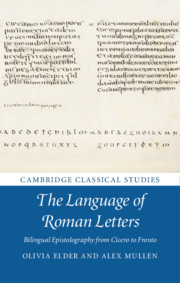
-
Select format
-
- Publisher:
- Cambridge University Press
- Publication date:
- September 2019
- October 2019
- ISBN:
- 9781108647649
- 9781108480161
- Dimensions:
- (216 x 138 mm)
- Weight & Pages:
- 0.59kg, 346 Pages
- Dimensions:
- Weight & Pages:
You may already have access via personal or institutional login
Book description
Roman letters demonstrate that language has imperium: the power to resolve problems, to negotiate relationships and to construct identities. This book combines sociolinguistic and historical approaches to explore how that power is deployed by the bilingual elite of the Roman Republic and Empire, offering the first systematic analysis of Greek code-switches in the letters of Cicero, Pliny, Marcus Aurelius and Fronto and in the Lives of Suetonius. Greek was a subtle tool within Latin epistolary communication, and an analysis of letter writers' bilingual practices reveals their manipulation of language to manage relationships between peers and across hierarchical or political divides, uncovering the workings of politics and society. Comparative analysis of Roman and modern code-switching contributes to the debate on how bilingual strategies in letters evolve and how they relate to oral and literary language. The language of letters illuminates the Roman world and its entanglements with Greek language and culture.
Contents
Metrics
Altmetric attention score
Full text views
Full text views help Loading metrics...
Loading metrics...
* Views captured on Cambridge Core between #date#. This data will be updated every 24 hours.
Usage data cannot currently be displayed.
Accessibility standard: Unknown
Why this information is here
This section outlines the accessibility features of this content - including support for screen readers, full keyboard navigation and high-contrast display options. This may not be relevant for you.
Accessibility Information
Accessibility compliance for the PDF of this book is currently unknown and may be updated in the future.


